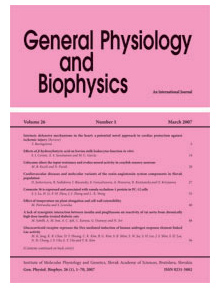General Physiology and Biophysics Vol.42, No.3, p 297–306, 2023
|
| Title: Chloroquine inhibits vasodilation induced by ATP-sensitive potassium channels in isolated rat aorta |
| Author: Kyeong-Eon Park, Soo Hee Lee, Sung Il Bae, Yeran Hwang, Seong-Ho Ok, Dawon Kang, Seung Hyun Ahn, Gyujin Sim, Jin Kyeong Park, Ju-Tae Sohn |
|
Abstract: This study examined the effect of chloroquine on vasodilation induced by levcromakalim in isolated endothelium-denuded rat aortas and clarified the underlying mechanisms. We examined the effects of chloroquine, hydroxychloroquine, lipid emulsion, reactive oxygen species (ROS) scavenger N-acetyl-ʟ-cysteine (NAC), and KATP channel inhibitor glibenclamide on levcromakalim-induced vasodilation. The effects of chloroquine, hydroxychloroquine, NAC, and levcromakalim on membrane hyperpolarization and ROS production were examined in aortic vascular smooth muscle cells (VSMCs). Chloroquine inhibited levcromakalim-induced vasodilation more than hydroxychloroquine. NAC attenuated chloroquine-mediated inhibition of levcromakalim-induced vasodilation, while lipid emulsion had no effect. Glibenclamide eliminated levcromakalim-induced vasodilation in aortas pretreated with chloroquine. Chloroquine and hydroxychloroquine inhibited levcromakalim-induced membrane hyperpolarization in VSMCs. Chloroquine and hydroxychloroquine both produced ROS, but chloroquine produced more. NAC inhibited chloroquine-induced ROS production in VSMCs. Collectively, these results suggest that, partially through ROS production, chloroquine inhibits levcromakalim-induced vasodilation. In addition, chloroquine-induced KATP channel-induced vasodilation impairment was not restored by lipid emulsion.
|
|
| Keywords: KATP channel — Levcromakalim — Vasodilation — Chloroquine — Reactive oxygen species |
|
|
Published online: 02-May-2023
|
| Year: 2023, Volume: 42, Issue: 3 |
Page From: 297, Page To: 306 |
doi:10.4149/gpb_2023008
|
|
 download file download file |
|
|
|
|
 download file
download file
